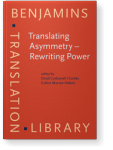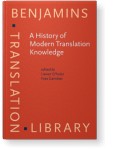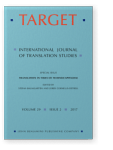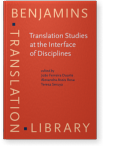Karen Bennett
List of John Benjamins publications for which Karen Bennett plays a role.
2021 Chapter 16. Agency and social responsibility in the translation of the migration crisis Translating Asymmetry – Rewriting Power, Carbonell i Cortés, Ovidi and Esther Monzó-Nebot (eds.), pp. 361–377 | Chapter
This paper looks at translator agency and ethics in the light of the current migration crisis, focusing on two concrete situations, one from the legal sphere and one from news translation-reportage. The first discusses how irresponsible choices in the translation of legal documents can… read more
2018 Chapter 3.5. Universal languages A History of Modern Translation Knowledge: Sources, concepts, effects, D’hulst, Lieven and Yves Gambier (eds.), pp. 195–201 | Chapter
2017 Foucault in English: The politics of exoticization Translation in times of technocapitalism, Baumgarten, Stefan and Jordi Cornellà-Detrell (eds.), pp. 222–243 | Article
It is something of a cliché to affirm that translations into English are almost always domestications, privileging fluency and naturalness over fidelity to the source text. However, back in the 1970s, many of Michel Foucault’s major texts, which were introduced to the English-speaking public for… read more
2009 Critical and corpus approaches to English academic text revision: A case study of articles by Portuguese humanities scholars English Text Construction 2:2, pp. 228–245 | Article
Portuguese academic discourse of the humanities is notoriously difficult to render into English, given the prevalence of rhetorical and discourse features that are largely alien to English academic style. The aim of this study was to test the hypothesis that some of those features might find their… read more
2006 Critical Language Study and Translation: The Case of Academic Discourse Translation Studies at the Interface of Disciplines, Duarte, João Ferreira, Alexandra Assis Rosa and Teresa Seruya (eds.), pp. 111–127 | Article
English academic discourse, which emerged in the 17th century as a vehicle for the new rationalist/scientific paradigm, is now the prestige discourse of modernity. Its hegemonic status in the world today means that other knowledges are rendered invisible, or have been swallowed up in a process of… read more




